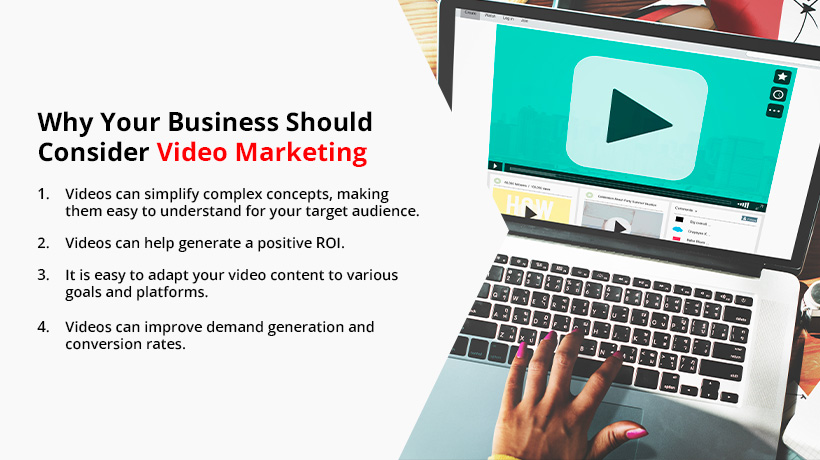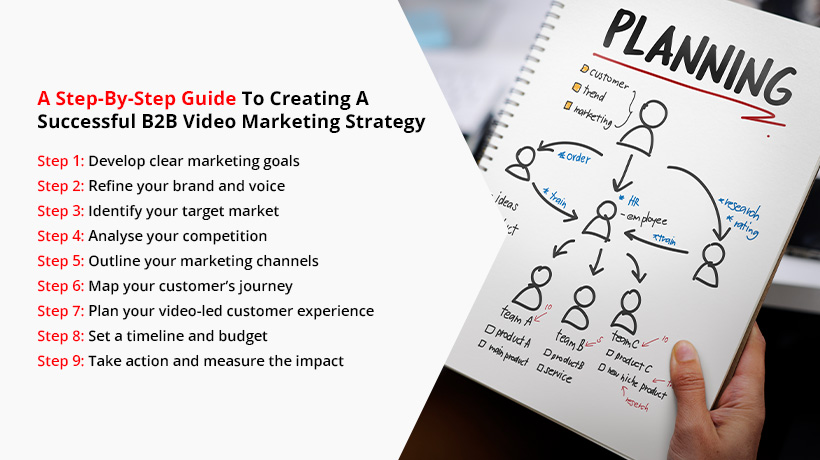In today’s digital age, where attention spans are short and content is abundant, seeking innovative ways to engage audiences effectively is essential for businesses to thrive. One such powerful tool that has emerged to build brand awareness within the business-to-business (B2B) sphere is video marketing.
However, while video production is becoming the new standard across B2B marketing channels, simply adding your advertisement and creative corporate videos to your website and social media account does not necessarily make them effective. Instead, a winning strategy with clear goals is essential to ensure your marketing campaign is successful!
An effective B2B video marketing strategy should leverage your video content for customer support, lead capture, relationship building, and sales. Let us show you how to get started by walking you through every step of devising an effective B2B video marketing strategy.
PART 2 – EVERYTHING YOU NEED TO KNOW ABOUT B2B VIDEO MARKETING
2.1. What Is B2B Video Marketing?

B2B marketing involves selling products and services to other businesses and organisations, with the aim of balancing the needs of the enterprise and the wants of the decision-maker. As a result, B2B marketing strategies often hinge on building connections, emphasising how the product or service can address pain points and provide the desired solution for these companies.
While a formal approach through old-school salesmanship remains valid, businesses can also rely on video marketing to foster authentic relationships through knowledge sharing. A well-crafted advertisement video can inform and educate current and prospective customers while appealing to their needs and interests.
That is why video production is fast becoming the marketing standard across industries, as it is highly effective at establishing trust with viewers. Moreover, video assets are much easier to implement across various marketing channels, making them ideal for inbound and outbound lead generation efforts.
2.2. Why Video Marketing Is Essential For Business Growth

Corporate video productions are no longer used solely for internal training. They are now an integral part of reaching out to your business prospects and growing your bottom line. So, if your enterprise has yet to adopt video marketing, you are missing out. Learn why video marketing is essential for business growth.
Reason 1: Simplify complex concepts for your target audience
Take a glance through several video platforms, and you will likely find plenty of explainer videos online. These demonstrative videos are popular for a reason – they can break down complex concepts into digestible pieces of information.
Whether you are detailing your company history or the technical specifications of your products, a video can support clear explanations by combining visuals with written or spoken words. Once potential clients view the video, they can better understand what you are offering and comprehend its value proposition, resulting in a more informed purchasing decision.
Reason 2: Generate a positive ROI
At the end of the day, every enterprise must be able to justify its marketing expenses. That is often measured by the return on investment (ROI). Fortunately, studies have shown that high-quality video productions can yield a significant ROI for businesses – research demonstrates that including a video on a landing page can increase conversion rates by up to 80%!
When you create videos to be long-term sales and marketing assets, they can support your ROI in various ways since they are easily shareable, allowing you to expand the videos’ reach and help you establish a robust online presence. For instance, case study videos are never outdated and have long-term impact. As such, they are effective for various lead generation approaches, allowing you to utilise one video for multiple scenarios and clients.
Reason 3: Highly flexible and adaptable
Today, no marketing campaign targets a single marketing goal or platform. Traditional paid ads and promotions on social media are all necessary to cater to a diverse audience. Whether it is a creative corporate video demonstrating your company’s commitment to corporate social responsibility or an advertisement video showcasing a new product, video content can complement your marketing campaign and help achieve your various marketing objectives.
Reason 4: Improve demand generation and conversion rates
In a B2B setting, your core audience will likely consist of people who prefer to conduct extensive research before purchasing or utilising a service. Video production is the ideal medium to capture the interest of these prospective clients. With a brief and engaging video summarising the products or services you offer and how they address the client’s problems, you can connect and pique the attention of your consumers.
Once the video filming is completed, incorporate your content into your marketing plan to drastically boost audience engagement and conversion rates. Studies have shown that people are 52% more likely to disseminate a video than other types of content. So, remember to provide your audience with a positive impression of your company to improve conversion via video content.
Learn More: Video Marketing In Singapore
PART 3 – DEVISING YOUR B2B VIDEO MARKETING STRATEGY
Now that you have a clear understanding of the value of video marketing, you must be eager to begin developing your B2B video marketing strategy. If you are unsure where to start, fret not! Let us share the essential tips and steps to help you craft an engaging video marketing strategy that resonates with your audience.
3.1. Quick Tips For Your B2B Video Marketing Strategy
Tip 1: Think outside the box

Remember, you are not the only enterprise utilising video productions as part of your marketing strategy. Most businesses in Singapore are adopting the same method. As such, thinking outside the box is essential to set your brand apart from others and create engagement. Consider innovative storytelling techniques, unique visual styles, and unexpected narratives to captivate your audience’s attention and leave a lasting impression.
Tip 2: Keep things concise
As a B2B enterprise, your clients comprise entirely of fellow entrepreneurs. As such, time is a precious commodity to them since they would often be preoccupied with operating their businesses. Therefore, it is essential for you to be mindful of your client’s time and keep your videos concise and focused, delivering your message succinctly.
Consider splitting your video production into a series of videos if you have plenty of material to share. Each segment can highlight a particular aspect of your business and go into more depth about your products or services. This way, you can produce valuable content without unnecessary fluff, ensuring your audience engages with your message without being overwhelmed.
Tip 3: Curate supporting content to complement your videos

Your video content should not exist in isolation, as clients rarely make significant decisions or large purchases based on one persuasive video. Instead, curate a spectrum of content for your audience, including blog posts, infographics, and case studies, that aligns with your video content. This holistic approach can enhance the overall impact of your message while providing clients with a comprehensive understanding of your products or services.
Tip 4: Ensure your videos align with your marketing goals
One of the secret ingredients to a successful video marketing strategy is to speak to your target persona. So, whether you are producing an advertisement video or a creative corporate video, ensure the content and format align with your specific objectives. The aim is to tailor your content to address the needs of your target audience and guide them seamlessly through the buyer’s journey.
Tip 5: Encourage video sharing

Word-of-mouth recommendations carry significant weight in the realm of B2B marketing. So, encourage your audience to share your creative videos within their networks. Social media sharing, email forwarding, or even old-school word-of-mouth can amplify your reach, creating a network effect that expands your brand’s visibility.
3.2. How To Create A Successful B2B Video Marketing Strategy

Here is a step-by-step guide on how to craft an effective B2B video marketing strategy:
Step 1: Develop clear marketing goals
To execute a successful marketing strategy, you must first know what you intend to accomplish ahead of time. Understanding your goals, including the key performance indicators (KPIs) that will indicate the campaign’s success, will determine your approach and help ensure you know when to pivot as needed. Please note that your KPIs should be specific, measurable, and include a deadline.
Step 2: Refine your brand and voice
Consistency in branding builds trust and recognition. A cohesive brand identity and voice not only resonates with audiences. It also makes it easier for prospective clients to remember your business. However, unless your business is new, your brand and voice will likely already be established. So, all you have to do is evaluate your past marketing campaigns and website.
Implementing a consistent brand and voice across your video productions as part of your marketing strategy can ensure a unified brand experience. Some examples to note include bringing the same energy and perspective and using the same graphics, fonts, and colours in your videos as the rest of your marketing assets.
Step 3: Identify your target market
Without understanding your target market and its pain points, it can be challenging to brainstorm video content ideas that align with what your audience is looking for. Therefore, you must first identify and explore what your prospective clients are interested in learning more about. You can begin by reviewing your sales data and understanding what businesses often move through your customer journey and make a purchase.
Once you have identified the businesses you want to target, develop a specific persona for those working at these organisations. Having a buyer profile outlined can make it easier to map a successful customer journey and gain potential leads. Subsequently, note the audience segments with the highest conversion rates and align your video content to their needs to increase the likelihood of them watching your videos.
Step 4: Analyse your competition
Assessing your competitors can be an excellent way to identify gaps and opportunities in the market. Start by researching your direct rivals – businesses similar in size and targeting the same industry. Review their advertisement videos, including their branding approach and product features, to see what works and what does not. Subsequently, learn from their successes and failures to refine your approach.
Step 5: Outline your marketing channels
Determine the platforms and channels where your target audience is most active to ensure the highest engagement. For example, avoid wasting time on TikTok if your target market does not use the social media platform often. Besides, most B2B businesses tend to stick with YouTube, Facebook, and LinkedIn.
With that said, there might be another video publishing platform within your niche, so it is best to know your target market’s preferred networking platforms. You can do this by analysing your various advertisement and corporate creative videos to identify which video publishing platforms offer the best engagement or conversion rate.
Step 6: Map your customer’s journey
Generally, B2C businesses create awareness of their products for potential customers to consider. Subsequently, the company stokes consumer demands and nurtures the relationship to ensure conversion. Finally, the buyer may require customer support and will hopefully become a loyal customer.

However, the B2B sales funnel is different. As B2B solutions are often more complex purchases with higher prices, the research and comparison phase is crucial for B2B businesses. Moreover, there is an additional stage termed ‘post-sales service’ covering the user experience from purchase through utilisation.

Understanding how your target market moves through each stage of the sales funnel is vital to implementing effective marketing tactics that resonate with your ideal audience.
Step 7: Plan your video-led customer experience
Once you have gathered the necessary information, plan how you intend to reach your prospective clients at each stage of the sales funnel. Here are some examples of the content you can produce at each juncture:
- Awareness – educational videos, blog posts, and social media posts;
- Research and competition – case studies and comparison guides;
- Conversion – demonstration videos and client testimonials;
- Post-sales service – exclusive video content, email newsletter, and success stories;
- Loyalty and retention – feedback surveys and loyalty programmes.
At each stage, you can utilise video content to improve the user experience. However, video production takes time and work, whether you are producing them in-house or employing a video production company. So, ensure you factor them into account when devising your marketing strategy.
Step 8: Set a timeline and budget
For each video you plan to create, it is always good to set a deadline with essential milestones along the way. Additionally, having a budget is crucial when working with professional videographers. With a predefined timeline and budget, you understand how much time and money you can spend hiring a video production house to create your marketing material.
Step 9: Take action and measure the impact
Once you have everything sorted out, it is time to implement your video marketing strategy! We recommend implementing your plan in stages, starting with the highest-impact content if time and budget are a pressing concern.
Along the way, you can track your results to determine if the campaign is successful. Choosing and analysing the correct metrics can allow you to understand when you are on target to meet your goals and when you are veering off course and must make adjustments.
Let us share a few of the most common metrics that you can measure to track the impact of your video content:
- Conversions
- Engagement
- Social shares
- View count
- Watch time
PART 4 – FAQs ABOUT VIDEO MARKETING
4.1. Your Most Pressing Video Marketing Questions Answered
Video marketing can be a complex topic, and many businesses, including yours, might have questions about how to get started. Of course, we try our best to address as many of your pressing concerns as possible. Nevertheless, we understand that you might have several questions that might not be covered in our comprehensive guide. So, let us compile the most frequently asked questions about video marketing we received from our clients and our response to these queries.
Question 1: Why should my business focus on video marketing?
The best thing about video marketing is its flexibility and low barrier to entry. You do not have to break the bank to hire a videographer to transform your creative vision into the video of your dreams. Whether you are producing a B2B or B2C marketing video, it can be optimised to reach your target audience.
Furthermore, the personal and interactive aspect of the video helps build trust between your business and potential clients or customers. Bonus point if the video contains creative and unique elements, as it can help get your brand trending on social media. When done well, video content can be a reliable cornerstone of any marketing campaign.
Question 2: Is there a reliable way to ensure my videos are a success?
There is no correct path to video marketing success. Nevertheless, you should have a comprehensive plan and stick to it. While devising your strategy, it is crucial to keep the following factors in mind:
1. What is your goal?
Start by asking what the aim of your video production is. Are you aiming to attain a sales target, or do you want to generate awareness? Map out topics and define what types of video can help you achieve these predetermined goals.
2. Who is your target audience?
Who do you want to reach with your videos? Defining your audience and researching who you are targetting can help you develop topics that will resonate with your target market.
3. What does success look like to you?
Determining what defines your video as a success can help you figure out the metrics to keep track of. With this information, you will have a clear idea of how well your video is received and whether you need to shift your strategy if it is not performing as expected.
Question 3: How can video marketing help increase my sales?
Video marketing can benefit your business in various ways. With the correct video content, you can help your target audience better understand your products or services and build trust in your enterprise. When your customers have an emotional connection with your brand, they are more likely to make a purchase. Additionally, you can optimise your videos for SEO to attract more traffic to your website, increasing the likelihood of converting visitors into customers.
PART 5 – CONCLUSION
As you can see, video marketing is an effective way to reach your target audience. Moreover, it is easier than ever to create and publish high-quality video content to share, given today’s online tools. So, if you have yet to invest in video production, now is the time! With the correct strategy, your business can reap the benefits of an impactful video marketing campaign in no time flat!
When you are ready to utilise video marketing as an additional lead generator, do not hesitate to contact our video experts at Vivid Snaps. As a multi-disciplinary media production company with a strong focus on corporate and creative video production, our professional videographers can help bring your ideas to life. Contact us today to learn how we can work together.
{
“@context”: “https://schema.org”,
“@type”: “Article”,
“mainEntityOfPage”: {
“@type”: “WebPage”,
“@id”: “https://www.vividsnaps.com/b2b-video-marketing-building-a-successful-strategy/”
},
“headline”: “B2B Video Marketing: Building A Successful Strategy”,
“description”: “In today’s digital age, where attention spans are short and content is abundant, businesses are constantly seeking innovative ways to engage their audience effectively. One such powerful tool that has emerged in the realm of B2B marketing is video marketing. This strategy utilizes compelling visual content to convey messages, showcase products, and build brand awareness within the business-to-business sphere. In this article, we will delve into the essentials of B2B video marketing, exploring its significance and the various ways it can be harnessed for business growth.”,
“image”: “”,
“author”: {
“@type”: “Organization”,
“name”: “Vivid Snaps”
},
“publisher”: {
“@type”: “Organization”,
“name”: “Vivid Snaps”,
“logo”: {
“@type”: “ImageObject”,
“url”: “”
}
},
“datePublished”: “2024-02-19”
}







